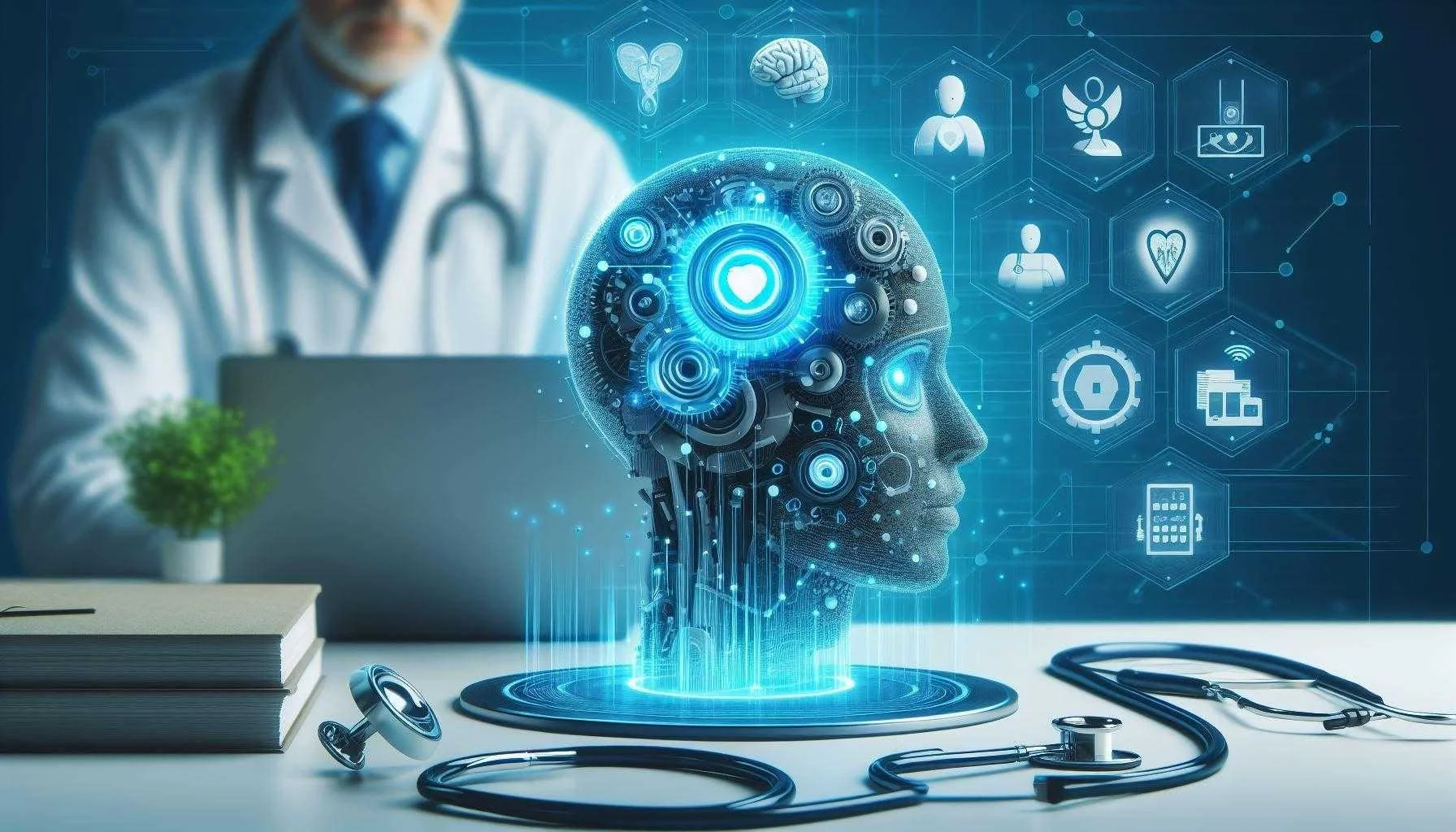How AI Can Be Beneficial to Healthcare Startups in 2024?

Introduction
Cutting-edge technologies like artificial intelligence and machine learning are changing a lot of industries, including healthcare. Healthcare is a big part of the global economy, making up about 10% of all the money made worldwide, which is around $8 trillion every year.
These fancy technologies are making a big difference in healthcare. They help with everything from creating new medicines and vaccines to making it easier for doctors to diagnose and treat patients. Using AI and machine learning makes the whole healthcare system work better and saves time and money.
AI is getting really good at doing things that humans do, but it can do them faster and cheaper. There are a lot of ways AI and robots can help in healthcare, just like they help us in our everyday lives.
In this blog post, we're going to talk about all the cool things AI can do in healthcare. We'll also look at some of the ideas for the startups.
Top AI Trends For Healthcare Startups

Predictive Analytics for Patient Care
Healthcare startups are increasingly leveraging predictive analytics powered by AI to forecast patient health outcomes. This involves analyzing historical data to identify patterns and predict potential health issues, allowing for proactive and personalized care.
Remote Patient Monitoring
AI-driven solutions enable continuous remote monitoring of patients, collecting real-time data on vital signs and other health metrics. This trend is particularly relevant in the post-pandemic era, offering a more comprehensive approach to healthcare beyond traditional in-person visits.
Personalized Treatment Plans
AI algorithms analyze patient data, including genetic information, lifestyle, and medical history, to create personalized treatment plans. This tailored approach improves treatment efficacy and minimizes adverse effects, marking a shift towards precision medicine.
Chatbots and Virtual Health Assistants
Healthcare startups are implementing AI-powered chatbots and virtual assistants to enhance patient engagement, provide quick medical information, and schedule appointments. These tools improve communication between patients and healthcare providers while reducing administrative burdens.
Drug Discovery and Development
AI is transforming the drug discovery process by accelerating the identification of potential drug candidates and predicting their effectiveness. Startups are utilizing machine learning models to analyze biological data, identify biomarkers, and streamline the drug development pipeline.
Natural Language Processing in Healthcare Records
NLP technologies are being employed to extract valuable insights from unstructured healthcare data, such as electronic health records and clinical notes. This aids in faster and more accurate information retrieval, supporting clinical decision-making.
Blockchain for Health Data Security
Blockchain technology is increasingly integrated into healthcare systems to ensure the security and integrity of patient data. AI complements this by enhancing data encryption, access control, and authentication, contributing to a more robust and privacy-focused healthcare ecosystem.
Robotics and Automation in Surgery
AI-driven robotics are assisting surgeons in performing complex procedures with precision and efficiency. Surgical robots equipped with AI algorithms can analyze real-time data, enhancing the surgeon's capabilities and potentially reducing recovery times for patients.
Population Health Management
AI facilitates population health management by analyzing large datasets to identify health trends and risk factors within specific populations. This information aids healthcare providers in designing targeted interventions and preventive measures for better public health outcomes.
Ethical AI and Regulatory Compliance
Adhering to guidelines ensures patient safety, data privacy, and transparency in the use of AI technologies within the healthcare industry.
Also Read: GO ONLINE WITH YOUR BUSINESS BY DEVELOPING A CUSTOM HEALTHCARE APP
Benefits Of AI to Healthcare Startups

Improved Decision-Making
AI enhances diagnostic accuracy by analyzing medical images, pathology reports, and patient data. Healthcare startups can leverage machine learning algorithms to assist healthcare professionals in making more accurate and timely diagnoses, leading to better patient outcomes.
Efficient Data Management
AI enables healthcare startups to efficiently manage and analyze large volumes of health data. This includes electronic health records, patient histories, and clinical notes. This streamlined data processing improves operational efficiency and supports evidence-based decision-making.
Enhanced Patient Experience
AI-driven chatbots and virtual assistants can enhance patient engagement by providing instant responses to queries, scheduling appointments, and delivering personalized health information. This improves the overall patient experience and satisfaction with healthcare services.
Cost Reduction
Automation through AI technologies helps healthcare startups optimize various processes, reducing manual work and associated costs. This includes administrative tasks, appointment scheduling, and data entry, allowing healthcare providers to focus more on patient care.
Remote Monitoring
AI-powered remote monitoring solutions enable healthcare startups to offer telehealth services, allowing patients to be monitored in real-time from their homes. This not only improves patient convenience but also reduces hospital readmissions and associated costs.
Personalized Treatment Plans
AI enables healthcare startups to create personalized treatment plans based on individual patient data, including genetics, lifestyle, and treatment response. This tailored approach can lead to more effective treatments, reduced side effects, and improved patient adherence.
Accelerated Drug Discovery and Development
AI expedites the drug discovery process by analyzing vast datasets and predicting potential drug candidates. This reduces the time and costs associated with bringing new drugs to market, benefiting healthcare startups involved in pharmaceutical research and development.
Better Security
AI technologies contribute to the security of healthcare data by identifying and preventing potential fraudulent activities. Machine learning algorithms can detect unusual patterns in billing, claims, or access to patient records, ensuring the integrity and confidentiality of healthcare information.
Streamlined Administrative Processes
AI automates administrative tasks such as billing, coding, and appointment scheduling, allowing healthcare startups to streamline their operations. This not only reduces administrative errors but also frees up valuable time for healthcare professionals to focus on patient care.
Continuous Learning and Improvement
AI systems can continuously learn from new data and feedback, improving their performance over time. Healthcare startups can benefit from adaptive AI algorithms that evolve and enhance their capabilities, staying up-to-date with the latest medical knowledge and practices.
Top Healthcare App Ideas For Startups to Invest In 2024

Startups have a unique opportunity to innovate and address pressing challenges through technology-driven solutions. Here are some comprehensive healthcare app ideas for startups to consider investing in for 2024:
Telemedicine Platform
In an era where accessibility to healthcare services is crucial, a telemedicine platform can bridge the gap between patients and healthcare professionals. By offering virtual consultations, diagnosis, and treatment, such platforms ensure that individuals can receive timely care regardless of their location. Incorporating features like secure messaging, video calls, and appointment scheduling enhances convenience and patient satisfaction.
Medication Management Tool
Adherence to medication regimens is a significant factor in managing chronic conditions effectively. A medication management app can assist users in organizing their medications, setting reminders for doses, and receiving alerts for refills. By promoting medication adherence, such apps contribute to better health outcomes and improved patient well-being.
Mental Health Support App
With mental health awareness on the rise, there's a growing demand for accessible and effective support services. A dedicated mental health app can offer resources such as mood tracking, guided meditation sessions, and access to licensed therapists for virtual counseling. Providing a safe and supportive environment, these apps empower users to prioritize their mental wellness.
Chronic Disease Management App
For individuals living with chronic conditions like diabetes or hypertension, managing their health can be challenging. A chronic disease management app can streamline the process by offering features such as health tracking, personalized care plans, and remote monitoring of vital signs. By empowering users to take control of their health, these apps contribute to improved disease management and quality of life.
Health and Fitness Tracker
As the importance of preventive healthcare continues to gain recognition, there's a growing demand for tools that facilitate healthy lifestyles. A comprehensive health and fitness app can track physical activity, nutrition intake, sleep patterns, and wellness goals. By integrating wearable device compatibility and gamification elements, these apps motivate users to adopt and maintain healthier habits.
Elderly Care App
With aging populations worldwide, there's a need for solutions that cater to the unique needs of seniors and their caregivers. An elderly care app can provide features such as medication reminders, emergency alerts, and virtual caregiver support. By promoting safety, independence, and social connection, these apps enhance the quality of life for seniors aging in place.
Healthcare Marketplace Platform
Simplifying access to healthcare services, a digital marketplace platform connects users with providers offering a range of medical services. From consultations and diagnostics to home care and wellness programs, these platforms offer convenience and choice. Features like provider profiles, appointment booking, and secure payment processing ensure seamless transactions for both users and providers.
Symptom Checker and Health Assessment Tool
Empowering users to make informed decisions about their health, a symptom checker and health assessment app provides personalized recommendations based on user input. Utilizing AI-driven algorithms and machine learning, these apps offer accurate assessments and guidance. By promoting early intervention and self-care, they contribute to proactive healthcare management.
Investing in these healthcare app ideas presents startups with the opportunity to make a meaningful impact on the industry while addressing evolving needs and trends. By leveraging technology to enhance access, convenience, and quality of care, these apps have the potential to transform the healthcare experience for millions of individuals worldwide.
Also Read: Top AI App Ideas For Android and iOS in 2024

Conclusion
In conclusion, AI holds immense potential to revolutionize healthcare startups in 2024, offering opportunities to enhance diagnostics, treatment, patient care, and operational efficiency. By harnessing the power of AI-driven solutions, healthcare startups can innovate, improve healthcare delivery, and ultimately contribute to better health outcomes for individuals worldwide.
Moreover, collaboration and partnership will be key to unlocking the full potential of AI in healthcare. By fostering interdisciplinary collaboration between technologists, healthcare professionals, policymakers, and patients, startups can co-create solutions that address real-world challenges and deliver meaningful impact.
Innow8 Apps stands ready to support healthcare startups in their AI endeavors, offering expertise in app development, AI integration, and healthcare domain knowledge. With our tailored solutions and commitment to excellence, we empower startups to harness the power of AI and drive innovation in healthcare.
How do you ensure the security and privacy of healthcare data in AI-driven apps?
We follow industry best practices and comply with regulations such as HIPAA to ensure the security and privacy of healthcare data. This includes implementing robust encryption, access controls, and data anonymization techniques.
What is your approach to integrating AI capabilities into existing healthcare systems or workflows?
Our approach involves understanding the specific needs and workflows of healthcare providers, collaborating closely with stakeholders, and designing solutions that seamlessly integrate with existing systems. We prioritize user experience and workflow efficiency to ensure smooth adoption by healthcare professionals.
How do you handle regulatory compliance requirements, such as HIPAA, when developing healthcare apps?
Compliance with regulatory requirements is a top priority for us. We ensure that our development processes, data handling practices, and security measures align with relevant regulations, including HIPAA. Our team undergoes regular training to stay updated on compliance standards.
What measures do you take to ensure the scalability and performance of AI-driven healthcare solutions?
Scalability and performance are integral considerations in our development process. We design our solutions with scalability in mind, leveraging cloud infrastructure and scalable architectures. We conduct rigorous testing and performance optimization to ensure smooth operation, even under high loads.
Stay Ahead of the Game: Explore Our Top 10 Insurance Tech Trends for 2024
Recent Blogs:
How to Build an Online Auction Application? |...
Learn how to build an online auction application with this comprehensive guide. Discover the...
Read More
Step by Step guide in building a Social Media...
A complete guide to help you build a social media app. Find out what all factors you should ...
Read More
How much money can you earn with an app in 20...
The potential revenue that can be generated with apps is high. So how can you earn money wit...
Read More